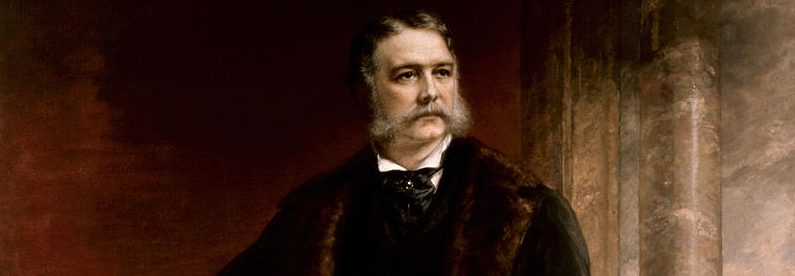Chester A. Arthur, one of the least-well-remembered presidents of the United States—he succeeded James A. Garfield after his assassination—could teach President Trump a thing or two about politics.
Arthur, a lawyer and Republican, rose to power during the Civil War years in New York City, explains The New Yorker, in its review of Scott S. Greenberger’s The Unexpected President. Working for then-governor Edwin Morgan, Arthur stood out as an organizational whiz, and would take the skills he learned during the war and become a wealthy player in the highly corrupt Republican political machine.
It led Arthur to one of the most coveted positions in politics: collector of the Custom House, where customs duties on imported goods were collected.
That would eventually bring the rather mild-mannered, emotional Arthur—who by no means, was looked at as anything close to a career politician at this point—to the 1880 Republican National Convention, where he surprisingly landed on Garfield’s ticket as vice president.
Soon thereafter, Garfield was assassinated and Arthur found himself in the Oval Office.
Instead of continuing to wave the banner of corruption once he ascended to the White House, though, Arthur decided to play it straight … for the most part. Writes The New Yorker‘s Thomas Mallon: “No visionary, he adopted a cautious, day-by-day approach to the job; assembled a competent Cabinet; and allowed his Secretary of State to pursue what [historian Thomas C. Reeves] calls a ‘formidable’ and ‘expansionist’ foreign policy.” He was also lauded for his early support of civil rights, and helped build up the U.S. Navy. Arthur might be best known for pushing civil-service reform via the Pendleton Act of 1883, a decidedly unsexy thing to be remembered for.
And of course, there were a few hiccups, including the Chinese Exclusion Act—which smacks of Trump’s attempted Muslim ban.
But all in all, Arthur, who served just a single term, dying from a kidney disorder a year after the 1884 election, was able to rise to the occasion of the presidency, however middling his term turned out to be. He made America OK again.
This article appeared in an InsideHook newsletter. Sign up for free to get more on travel, wellness, style, drinking, and culture.
























